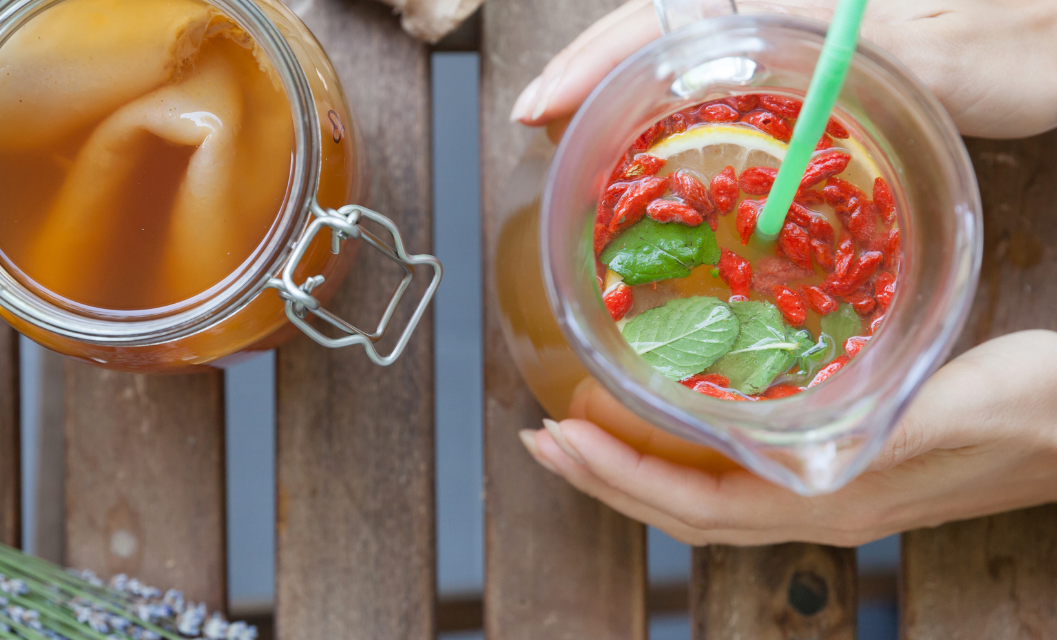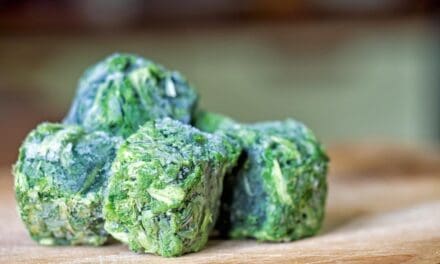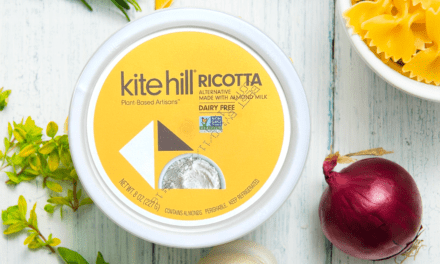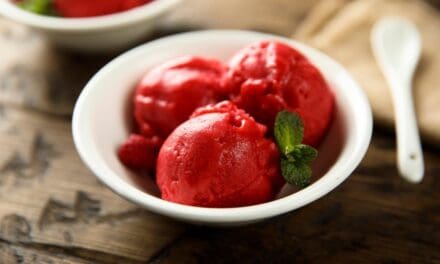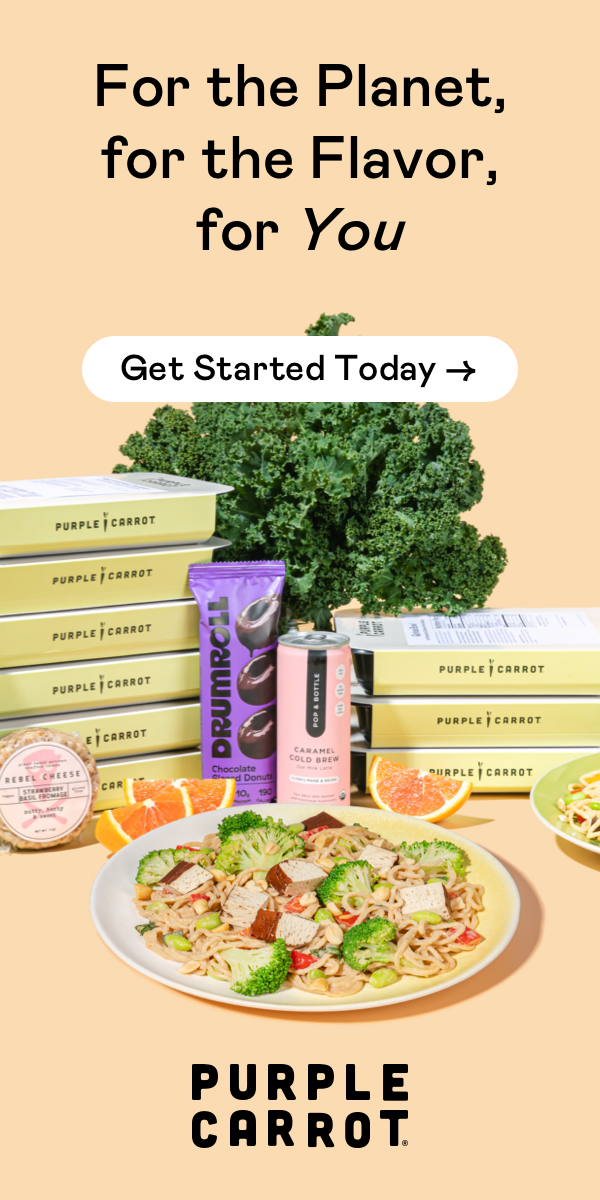The gut is arguably one of the most important parts of the human body, second only to the brain. Its job is to extract nutrients from the food you’re digesting and control a vast majority of the body’s immune system. Inside the gut are trillions of bacteria that communicate with the body. Healthy bacteria strengthen the immune system, provide loads more energy for the body, and improve mental health significantly. Studies have shown that probiotics, a type of bacteria found in fermented foods, are great for improving and maintaining gut health, among other fruits, nuts, and veggies. Show your gut some love and check out these 9 vegan foods that are great for your gut!
1. KIMCHI
Kimchi is a fermented traditional Korean food made from a variety of vegetables and spices. It is made with cabbage and includes other vegetables, like onions and carrots, which are spiced with salt and Korean chilies called gochugaru. Once these fresh ingredients are combined they’re left to ferment in the fridge until ready to eat, and the fermentation process usually takes up to two weeks. It can be eaten on its own or as a condiment with a stir-fry or rice dish (or any other type of meal) and tastes salty, spicy, and sour.
Once fermented, the kimchi is packed with hundreds of varieties of bacteria (one of the highest of any fermented food) that your body and gut love. Additionally, it’s a rich source of fiber, potassium, and calcium. Kimchi eaters have reported strengthened immune systems and healthier bowel movements as its benefits. The only downside to kimchi is its high salt content, which may be a risk to those with high blood pressure. Mother In Law’s is a kimchi brand that has a lot of vegan kimchi options like their Vegan Napa Cabbage Kimchi.
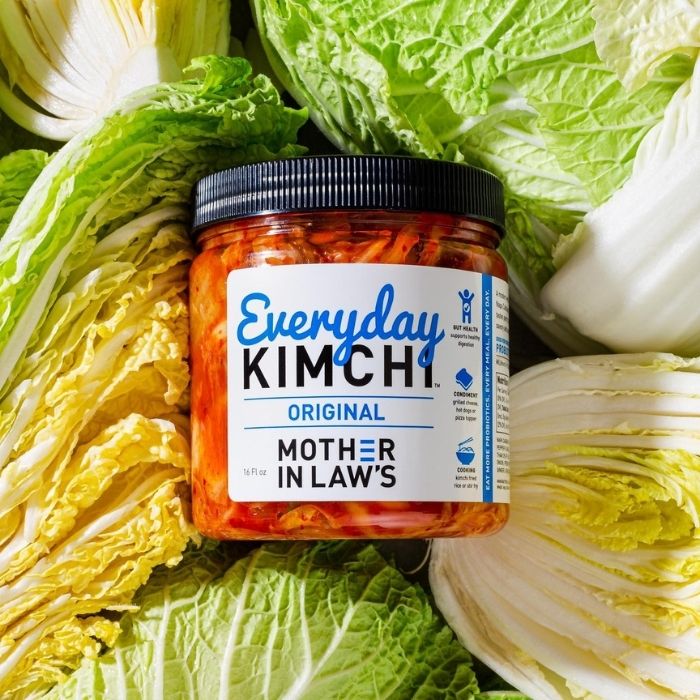
Mother In Law’s Everyday Vegan Kimchi | Photo Credit: Mother In Law’s / Instagram @milkimch2
2. SAUERKRAUT
Sauerkraut is basically kimchi’s distant European relative. Most popular in Germany, this condiment is made exclusively from fermented cabbage. For those with little to no experience fermenting foods, sauerkraut is hands-down the easiest fermented food to make. The only ingredients you need to make sauerkraut are water, salt, and any variety of cabbage. Let the mixture sit in the fridge for a few weeks and eventually you’ll have a wonderfully crunchy salty side for any meal. ‘The Kraut’ is most commonly served on burgers or hot dogs, but in Germany, it gets eaten as a condiment to most meals.
The probiotics and other bacterias that grow in sauerkraut have a huge list of benefits. Obviously, it’s great for your gut health and provides your gut with hundreds of healthy bacteria which, in turn, provide your body with improved energy and bowel movements. Studies have shown that sauerkraut is a great remedy for people afflicted with IBS (Irritable Bowel Syndrome). It is also full of fiber, which aids in digestion and balances blood sugar, and high in vitamin C, which supports the immune system. When looking to purchase sauerkraut, it’s best to look for unpasteurized kinds since a lot of the beneficial bacteria are destroyed during pasteurization.
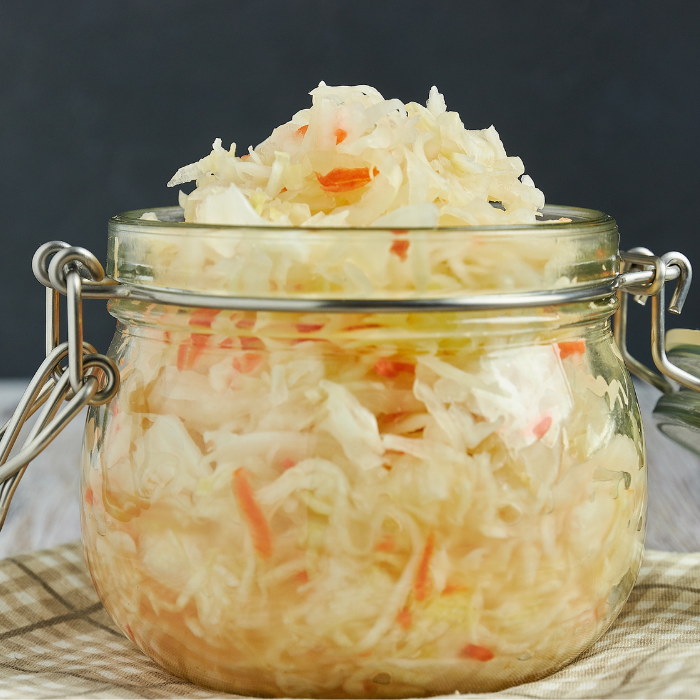
You can easily make your own sauerkraut at home.
3. MISO
Miso, meaning ‘fermented bean’ in Japanese, is a traditional paste originating from Japan and is made by fermenting soybeans. Miso soup, a broth of miso paste and vegetables, is a breakfast staple in Japan and other parts of Asia but is also available all over the world. This protein-rich paste has a strong flavor and adds the fifth taste – ‘umami’ – to any miso-based soup, stew, glaze, or marinade.
Miso is loaded with nutrition. It’s fermented, meaning it contains a wide variety of bacteria, enzymes, and probiotics which, as we know, are our gut’s best friends. On top of that, studies have shown that the probiotics provided by miso synthesize certain vitamins, like vitamin K and B12, as a byproduct of metabolism. Next time you’re jonesing for some take-out sushi or chow-mein, make sure to order a side of miso with that.
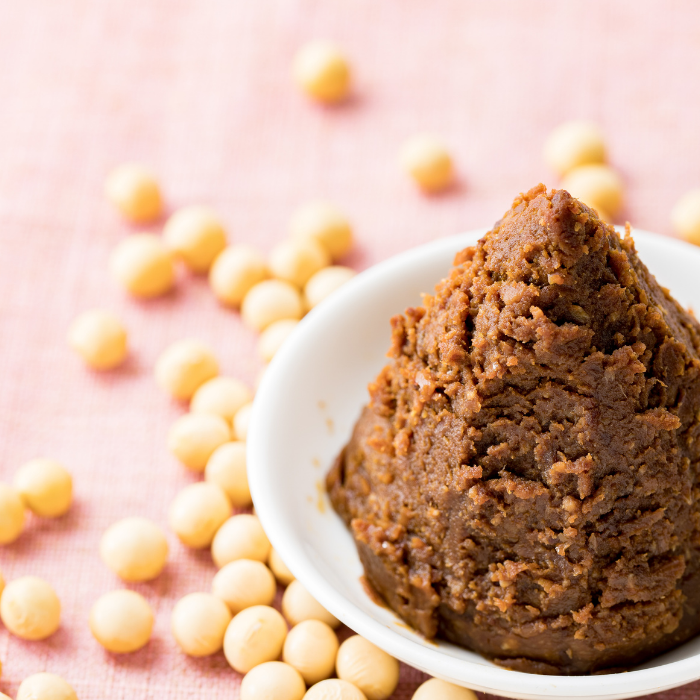
Miso contains a wide variety of bacteria, enzymes, & probiotics.
4. KOMBUCHA
Kombucha is a delicious fermented beverage that is thought to have originated in either Japan or China thousands of years ago. It is made by adding bacteria, yeast, and sugar to black or green tea. It is then left to ferment for a week or more. Kombucha that is fermented for longer loses sweetness and becomes more acidic. During the fermentation, a blobby mushroom-like layer forms on the surface of the drink. This blob is called a scoby. The scoby is a living colony of bacteria and yeast that can be used to repopulate a new batch of tea.
This miracle concoction is filled with loads of yeasts, bacteria, and probiotics that are great for improving and strengthening your gut. Its tea-base is filled with antioxidants (especially green tea), which contribute a wealth of additional health benefits like lowered risk of cancer and heart disease, improved cholesterol, weight loss, and mental health. This magic potion is easy to make at home, but be careful to follow instructions to a ‘tea’. Consuming badly-brewed kombucha is known to have some seriously unpleasant side effects. Store-bought kombucha is always safe to drink.
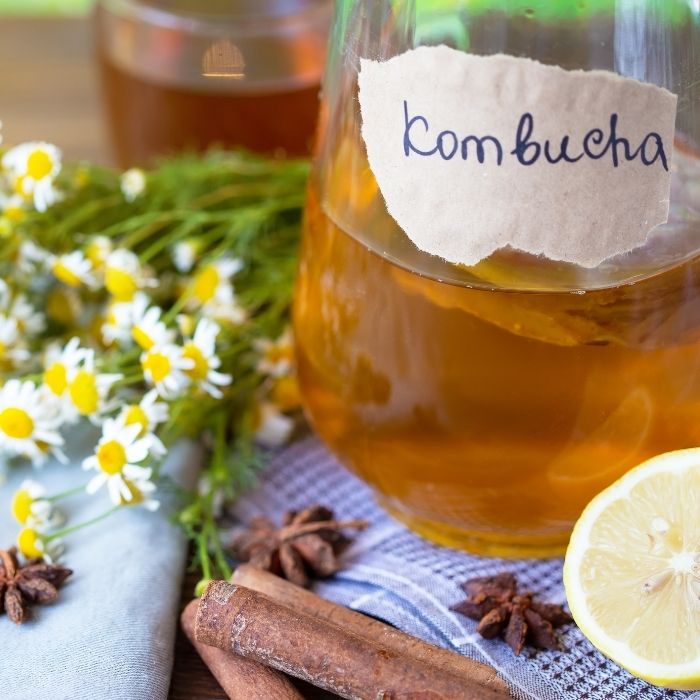
Kombucha is fairly easy to make at home if you can get a hold of a “scoby” starter.
5. PICKLES
Some people love these savory treats, especially on sandwiches or burgers; others can’t seem to stomach them. Regardless, pickles love you. Although you can pickle a lot of different veggies, when most people talk about pickles they are referring to a type of small cucumber that’s been fermented in salt-water brine for about a week and preserved in a jar. The fermentation process allows the pickles to preserve for a few months.
Pickles are great sources of probiotics, and so is the brine they’re preserved in. Eating pickles will give your gut everything it needs to flourish and so will drinking the pickle juice. Just make sure you purchase fermented pickles and not the pickles preserved in vinegar like many commercial brands. A lot of times true fermented pickles can be found in the deli section of the supermarket. Cucumbers are also a great source of antioxidants and vitamins just by way of being vegetables. Sometimes cooked veggies lose certain nutrients after being cooked, but the brine preserves all of the cucumber’s nutritional value. Hopefully, you’ll think twice before asking for your sandwich with no pickles.
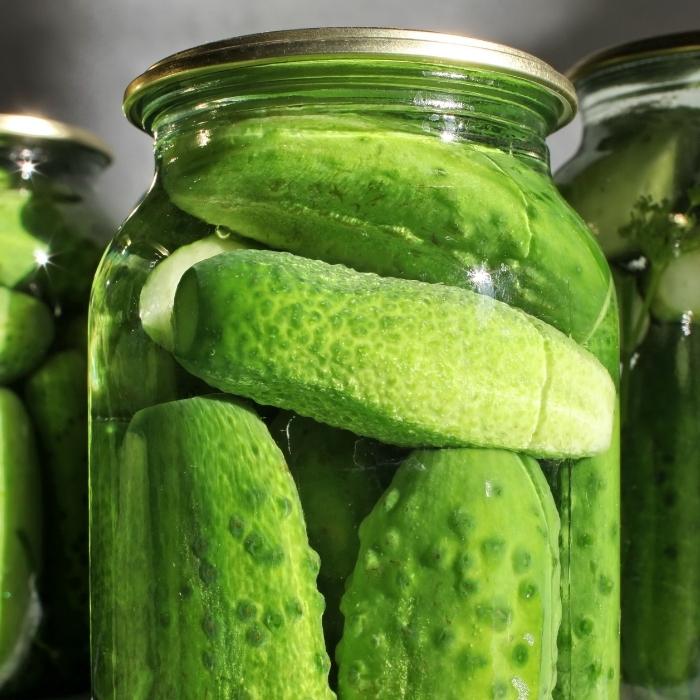
Look for true fermented pickles in your supermarket and not just pickles made with vinegar.
6. SOURDOUGH
Some historians speculate that the sourdough bread recipe is the oldest known to man. The earliest evidence of sourdough bread was found in Switzerland, estimated to be from 3700BC, but may have been around for a few thousand more years. This ancient bread is made by baking dough that’s been fermented with natural bacteria and yeasts. Although the fermentation of the dough does produce gut-loving probiotics, they go away when the bread is baked due to extremely high temperatures.
There is still hope, however. The probiotics are essential in the growth of lactic acid and prebiotics. Lactic acid is what gives the bread its amazing “sour” flavor, while also preserving the bread by preventing mold contamination. Prebiotics are a type of fiber that feeds the good bacteria in our gut, almost like fertilizer. They survive the baking process by way of high heat resistance. Sourdough is also much easier to digest than other breads, has a very low glycemic index (low-GI) and will leave you feeling fuller for longer.
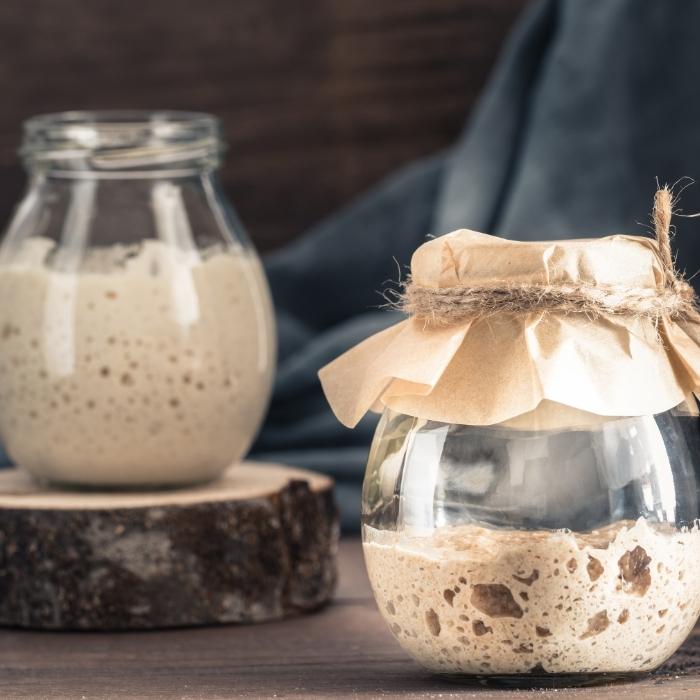
Rye and wheat sourdough starter.
7. ALMONDS
It may shock you to learn that the almond – loved by health-nuts all over the world – isn’t a nut. It is in fact the seed of the almond fruit which grows on the almond tree. When the fruit ripens the soft seed develops into what we know was a raw almond. The raw almond is then roasted and sold as the nutritious “nut” we know and love.
Almonds don’t ferment like the other foods on this list, so they don’t provide the body with any probiotics. Thankfully, they’re an excellent source of prebiotics – the fiber that feeds and nourishes all of the bacteria colonies living in your gut. They’re also known to contain essential fats, proteins and vitamin E. Almonds have so many proven health benefits: they’re a great source of antioxidants, they lower cholesterol levels, they regulate blood-sugar levels, and they even reduce hunger, lessening the body’s calorie intake.
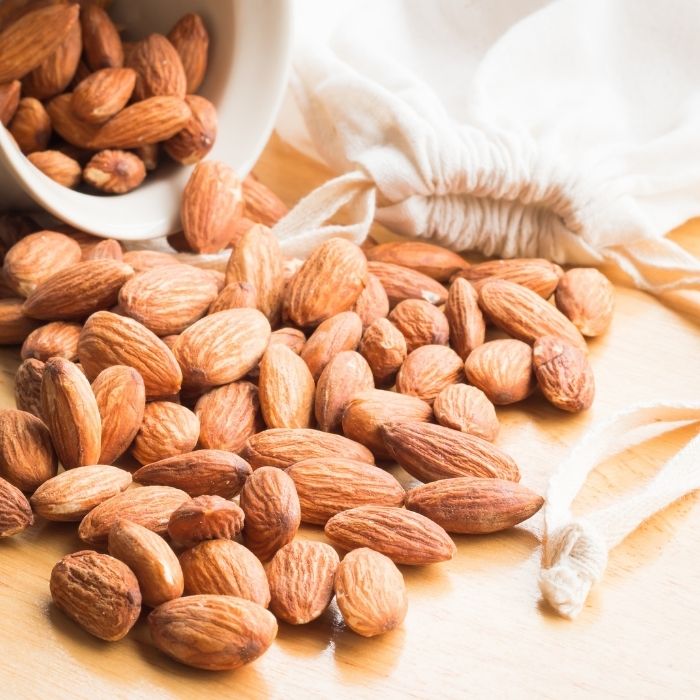
Almonds are a great prebiotic food that feed the flora in your gut.
8. OLIVE OIL
Olive oil is an essential item in any home; it is easily the most common salad dressing in the world today and some people even use it for skin care and home remedies. This beautiful golden liquid is pressed from the fruit of the olive tree and slightly refined. The least refined, and healthiest type of olive oil is known as “extra virgin” olive oil.
It is dense in healthy fats and acids which are great at nourishing and strengthening the bacteria and microbiomes in your gut. It also contains antioxidants and vitamins that are known to reduce inflammation and protect against heart disease.

Purchase extra virgin olive oil for the best nutritional benefits.
9. GARLIC
Garlic boasts a wealth of health benefits attributed to the variety of vitamins and minerals it provides the body. Garlic is also a natural prebiotic because it contains non-digestible fibers like inulin. Studies have also shown that it helps prevent bad bacteria from growing. It may be bad for your breath, but it’s definitely good for your gut!
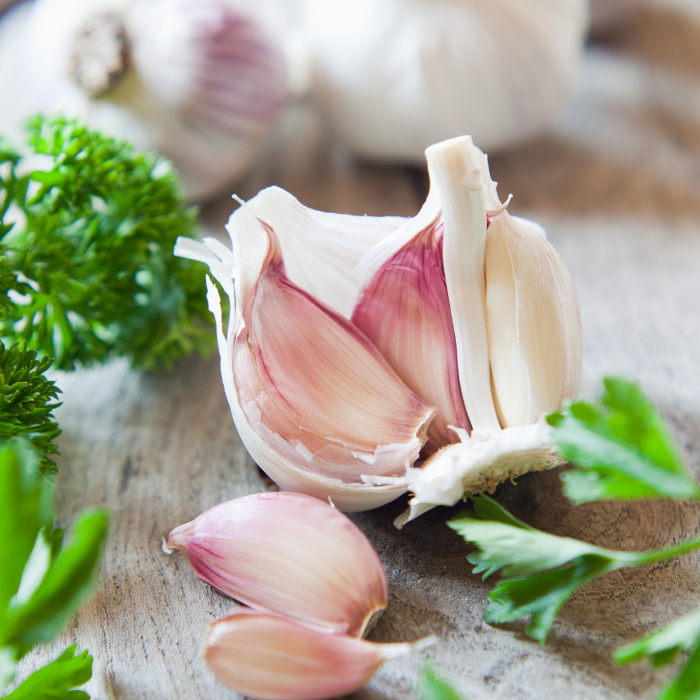
Garlic is a natural prebiotic.
The digestive system doesn’t get the medical recognition it deserves. Modern diets are built on a foundation of processed sugar and white carbohydrates; both have a bad reputation among dieticians and are known to have undeniably negative effects on the gut. By implementing these gut-friendly foods into your diet you should experience positive changes to your body, mind and mood!

